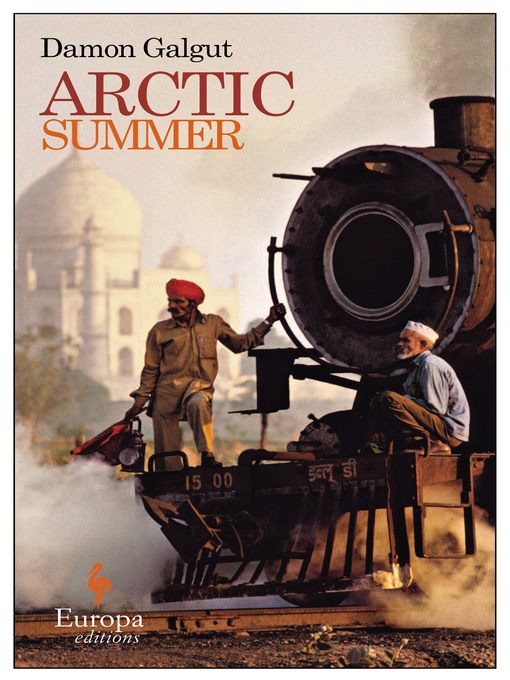
Arctic Summer
کتاب های مرتبط
- اطلاعات
- نقد و بررسی
- دیدگاه کاربران
نقد و بررسی

July 7, 2014
Talented South African writer Galgut (The Good Doctor) returns with a well-
researched if occasionally leaden novel about E.M. Forster. Set mostly between Forster’s first trip to India in 1912, during which he visits the caves that play so great a role in A Passage to India, and the 1924 publication of that classic, the novel explores Forster’s intense, sexually tinged friendships with an Indian lawyer, Syed Ross Masood, to whom he dedicated Passage, and the Egyptian tram conductor Mohammed el Adl. Galgut chronicles Forster’s struggle to complete his “Indian novel” and his “invisible, double life” as a homosexual. The avidity of what were then termed Morgan’s “minorite” desires are effectively conveyed, as is the timidity that often frustrates them; Morgan is 37 when he loses his virginity to a British soldier in Alexandria. Unfortunately, some hammy descriptions of Forster at work weigh on the prose (“In one moment, as if lit up by lightning, he had seen the whole arc of events”), and the cameos made by the likes of Virginia and Leonard Woolf, Lytton Strachey, and a fulminating D.H. Lawrence seem perfunctory. Any flatness stands out: the cost of fictionalizing a great writer. Agent: Anna Stein, Aitken Alexander Associates.

August 1, 2014
In this novel based on the life of E.M. Forster, Galgut (In a Strange Room, 2010, etc.) focuses on the novelist's visits to India, his time in Egypt and his homoerotic yearnings. The opening sets the tone. Morgan, as he is known, is on a vessel steaming toward India in 1912. A British army officer tells him of his many sexual conquests of Indian men and boys; Morgan finds this titillating. He's a timid mama's boy, a closeted gay man, still a virgin at 33. His four published novels have examined heterosexual relationships; his gay novel, Maurice, will be published posthumously. Yet Morgan has known romance. In England some years before, he became friends with Masood, an aristocratic young Muslim Indian. While Masood gently rejected Morgan's advances, the friendship blossomed. "Friendship is your Empire, Morgan," declared the anti-imperialist Indian. Aside from his reunion with Masood, his first visit to India introduces Morgan to its religious and caste divisions and its frequently obnoxious British rulers; it also sows the first seeds of A Passage to India, written years later. Another opportunity to travel arises in 1915. The Great War is underway. Morgan works for the Red Cross in Alexandria, visiting hospitalized soldiers. He finally has his first sexual experience, fellating a soldier on a secluded beach: "this was the realest moment of his life." Even if we accept that, Galgut's focus on Morgan's sexual needs is reductive. You wouldn't know, apart from passing references (Lytton Strachey, the Woolfs), that he was a Bloomsbury figure himself. Another romance catches fire in Alexandria. Mohammed is a humble tram conductor; like Masood, he isn't gay, but he indulges Morgan's needs to an extent while cherishing their friendship. Most of this has been documented in four biographies, as Galgut acknowledges. Forster remains elusive in this unbalanced account.
COPYRIGHT(2014) Kirkus Reviews, ALL RIGHTS RESERVED.

Starred review from September 1, 2014
Brilliantly conceived and executed, Galgut's novelized biography of the great British writer E. M. Forster begins in 1912 with Forster's first voyage to India. His purpose in going there is to reconnect with a young Indian, Syed Ross Masood, whom he had befriended when he taught the young man Latin. For Forster, a repressed homosexual, however, it was more than friendship he desired. He had fallen desperately in love with Masood, who was heterosexual. Galgut does an exceptionally good job of conveying Forster's sadness, yearning, and frustration, all of which came into play again when he later fell in love with an Egyptian tram conductor, Mohammed el-Adl, who was also heterosexual but permitted the occasional sexual encounter. While much of the novel focuses on Forster's sometimes heartbreaking search for love, it also deals with his nine-year-long writer's block that finally ended when he was able to complete his masterpiece, A Passage to India. If Galgut takes readers into Forster's heart, he also takes them into his mind and its own journey to self-discovery. Along the way readers will encounter such Forster friends as Virginia and Leonard Woolf, D. H. Lawrence, Lytton Strachey, and others, all the while becoming immersed in the book's beautifully realized and often exotic settings. Two of Galgut's earlier novels were shortlisted for the prestigious Man Booker Prize, and it is likely that this memorable new one will also be a contender for that and other glittering awards.(Reprinted with permission of Booklist, copyright 2014, American Library Association.)

























دیدگاه کاربران